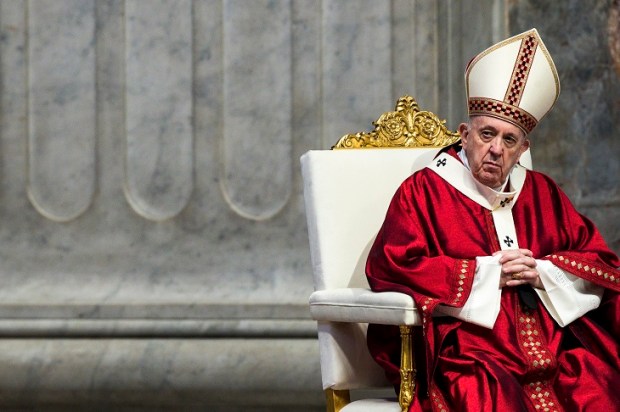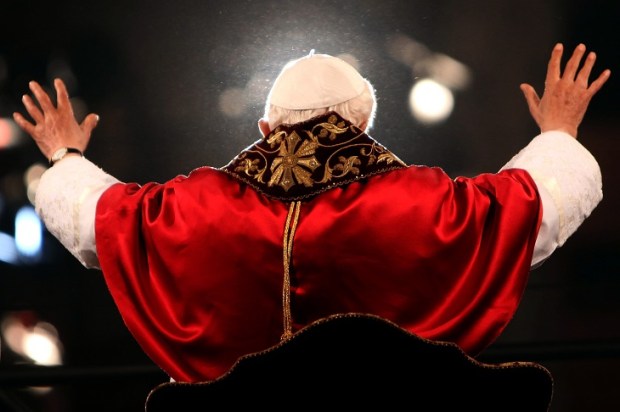I wish I didn’t have to write articles about the Catholic Church. Genuinely, I wish the Catholic Church would act perfectly Catholic, imitate Christ in every way, and that it would – without blemish – reflect the values He bestowed upon the world. I wish that I could be writing articles about politicians doing silly things or warning the world about how AI is going to destroy the world instead…
Yet here I am, again, writing another piece about individuals within the Catholic Church turning it into something it was never meant to be. God did not give us the Church so that we could use it to push political opinion and yet goodness knows how many individuals and organisations associated with the Catholic Church in Australia are pushing the same view that Catholics should, ‘in the spirit of Reconciliation’, vote in favour of the Voice to Parliament.
For those who are not familiar, the National Aboriginal and Torres Strait Islander Catholic Council (NATSICC), an advisory body to the Australian Catholic Bishops on issues relating to Aboriginal and Torres Strait Islander Catholics, is a group that encourages the melding of Indigenous Spirituality into the Church through several (more liberal) Bishops who make up the Bishops Commission for relations with Aboriginal and Torres Strait Islander Catholics.
NATSICC have developed a rubric of their own for how the Mass can incorporate Indigenous practices. They suggest including didgeridoos and clapsticks in the sacred music, beginning each Mass with an Acknowledgment of Country and holding smoking ceremonies within the Mass whereby an Indigenous elder could smoke the Priest, the altar, and the congregation, including Indigenous people in the Prayers of the Faithful. They also bring the bread for consecration to the altar in a coolamon, substituting the Our Father in the Lord’s Prayer – which is supposed to remain forever unchanged – with the Aboriginal Our Father.
Aside from changing Mass, they’re also fiercely advocating the Voice to Parliament, and they have a lot of help from Catholic individuals and organisations in Australia.
NATSICC have even created a website dedicated to the Voice and those promoting it within the Church.
We’ll start with the organisations.
St Vincent de Paul Society (aka Vinnies) has thrown its full support behind the Voice, stating that they believe it will: ‘…not only recognise the special place of Aboriginal and Torres Strait Islander people in Australia’s history, but also ensure that it can’t be shut down by future governments.’
Caritas Australia, who run the Project Compassion collection around the season of Lent in the lead-up to Easter each year, have stated they ‘fully support the call for Voice, Treaty, and Truth’.
In addition, the National Catholic Education Commission and Marist Schools Australia are also in support of the Voice, with the NCEC labelling it ‘a critical step along Australia’s path towards reconciliation’. Marist Schools Australia took it a step further, stating: ‘All Christians, their pastors included, are called to show concern for the building of a better world. This is essential, for the Church’s social thought is primarily positive: it offers proposals, it works for change and in this sense, it constantly points to the hope born of the loving heart of Jesus Christ.’
It is my personal view that Jesus Christ would not approve of something that is going to enshrine racial privilege into the Constitution and create further division in Australia and in the Church.
Catholic schools are rapidly becoming the next battleground in the seemingly never-ending spiritual warfare, with ideas and curricula coming into the fray that may well completely transform the original Faith and secularise the students in these schools.
There are dozens more organisations (including social services, education facilities, and charities) and individuals within the Church who support the Voice, including Bishops and Archbishops.
Bishop Harris says that his ‘appeal to vote “Yes” to the Indigenous Voice is not a political appeal as such, but an appeal to the innate goodness of humanity’.
Not everyone agrees.
Others argue that the true purpose of the Voice, which Prime Minister Anthony Albanese is keeping mum on until after the vote, is not about the innate goodness of humanity, but about creating a political arm that will hold Parliament and the country hostage on any legislation they do not like.
Archbishop Coleridge stated, ‘I’m strongly committed to the Voice. I’ve listened to important and convincing Indigenous voices on this topic.’ I offer a counter perspective that just because a voice is convincing, it does not mean that it is right. Would a truly faithful Catholic change Church doctrine simply because someone was incredibly convincing in their arguments to do so?
Archbishop Comensoli said, ‘My hope is simply that Catholics will be inspired by Jesus to join the hard work of finding constitutional recognition of the voice of First Peoples into our Parliament and that reconciliation will find new energy and witness at this moment in history.’
While reconciliation is good, Indigenous Australians are already represented in Parliament by several Indigenous politicians, including Senator Jacinta Nampijinpa Price, who some proponents of the Voice have been quick to attack and degrade because she does not support the Voice. Price has instead called for legitimate and genuine ways of assisting Indigenous communities in dealing with significant issues that are creating much hardship for them. It is incredibly hypocritical that there are people who call for a Voice to Parliament who then refuse to support the Indigenous voices that are already present.
Bishop Vincent added, ‘The Catholic Church, at its synodal gathering called the Plenary Council, endorsed the Uluru Statement and the Voice to Parliament as part of our mission to shape a more just and compassionate society. It recognises that we can be a better society by walking alongside with our First Nations people and enabling them to take their rightful place at the table.’ Again, Indigenous Australians are already being included in society and are already represented in Parliament. They are already at the table.
In my view, the Plenary Council was an abject failure. It presented an opportunity for the Catholic Church in Australia to consider the failures of the past and find ways to reinvigorate the Church and Catholics in this nation. Instead, it chose to focus on attempting to change church doctrine, something that only the Vatican can do. This included calling for women to be instituted as Deacons and even Priests and rewriting the Catechism of the Catholic Church in a more inclusive style that considers LGBTQ+ people. It also decided to integrate Indigenous rituals, which are pagan rituals, into the Catholic Mass. If you want to read more about that, you can read this article I wrote last year.
Support for the Voice is widespread within the Catholic leadership. You can explore this support here.
But many Catholics feel as I do. They are fed up with the Catholic Church being pushed towards something that is more of the world than of God. Jesus Christ did not start the Catholic Church so it could embroil itself in political agendas. He did not tell the Apostles to go out and allow other religious practices to be integrated into the Church. He did not tell the pagans they could join the Church He was establishing and incorporate their ideals and ways of living into it philosophy. Jesus called for unity, not division.
Religious leaders and organisations may think they are doing the ‘right thing’ by saying we need to be united as Catholics on the Voice to Parliament and support it by voting ‘Yes’ in the upcoming referendum. But the Pharisees also thought they were doing the ‘right thing’ by demanding that the people of Jerusalem live by the ways of the Old Law while Jesus was instituting a new, everlasting one that was intended to endure until the end of time.
So, why should Catholics vote ‘No’ to the referendum? It’s simple. The message of Christ was not one of division, but of unity. This referendum only serves to further divide society by ethnicity. Jesus’ mission on Earth, a mission that has been handed on to the Catholics of the world today, was to call the world to conversion and ‘love one another as I have loved you’. Conforming the Church to the practices of Indigenous Australians is by no means calling the world to conversion. We can, however, welcome our Indigenous brothers and sisters into the Catholic Church. So too can we help Indigenous communities in more meaningful and impactful ways, such as those that Indigenous representatives like Jacinta Price are highlighting.
And, finally, if you value the Catholic Mass and its traditions, then voting ‘No’ is the only viable option. If you give even a little to entities hungry for change, there would likely be nothing stopping them from altering Mass further to suit their ideology.
It is my view, and that of a growing number of Australians, that the Voice to Parliament will achieve nothing more than bolstering a small group of ideologues. There is nothing remotely Catholic about supporting it. And, while I respect everyone’s right to their own views on the Voice, in order to push back against the misguided noise coming from individuals and organisations within the Catholic Church, I am encouraging every Catholic to vote ‘No’.

























